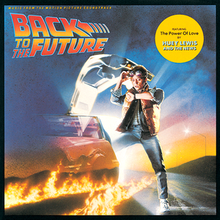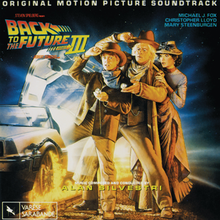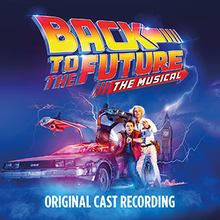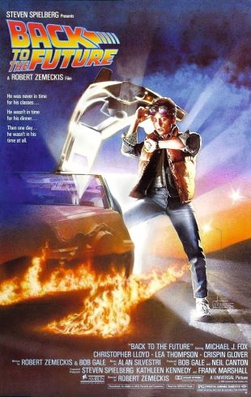
Back to the Future is a 1985 American science fiction film directed by Robert Zemeckis and written by Zemeckis and Bob Gale. It stars Michael J. Fox, Christopher Lloyd, Lea Thompson, Crispin Glover, and Thomas F. Wilson. Set in 1985, it follows Marty McFly (Fox), a teenager accidentally sent back to 1955 in a time-traveling DeLorean automobile built by his eccentric scientist friend Emmett "Doc" Brown (Lloyd), where he inadvertently prevents his future parents from falling in love – threatening his own existence – and is forced to reconcile them and somehow get back to the future.

Back to the Future Part II is a 1989 American science fiction film directed by Robert Zemeckis from a screenplay by Bob Gale; both wrote the story. It is the sequel to the 1985 film Back to the Future and the second installment in the Back to the Future franchise. The film stars Michael J. Fox, Christopher Lloyd, Lea Thompson, and Thomas F. Wilson with Elisabeth Shue, and Jeffrey Weissman in supporting roles. It follows Marty McFly (Fox) and his friend Dr. Emmett "Doc" Brown (Lloyd) as they travel from 1985 to 2015 to prevent Marty's son from sabotaging the McFly family's future. When their arch-nemesis Biff Tannen (Wilson) steals Doc's DeLorean time machine and uses it to alter history for his benefit, the duo must return to 1955 to restore the timeline.
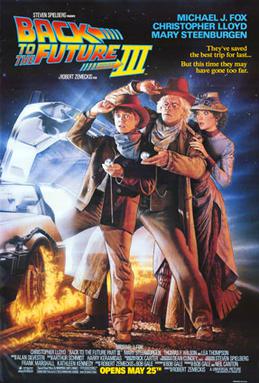
Back to the Future Part III is a 1990 American science fiction Western film and the final installment of the Back to the Future trilogy. The film was directed by Robert Zemeckis, and stars Michael J. Fox, Christopher Lloyd, Mary Steenburgen, Thomas F. Wilson, and Lea Thompson. The film continues immediately following Back to the Future Part II (1989); while stranded in 1955 during his time travel adventures, Marty McFly (Fox) discovers that his friend Dr. Emmett "Doc" Brown (Lloyd), trapped in 1885, was killed by Buford "Mad Dog" Tannen (Wilson), Biff's great-grandfather. Marty travels to 1885 to rescue Doc and return once again to 1985, but matters are complicated when Doc falls in love with Clara Clayton (Steenburgen).

Martin Seamus "Marty" McFly is a fictional character and the protagonist of the Back to the Future franchise. He is a high school student who accidentally becomes a time traveler and alters history after his friend Emmett Brown invents a DeLorean time machine.

Alan Anthony Silvestri is an American composer and conductor of film and television scores. He has been associated with director Robert Zemeckis since 1984, composing music for nearly all of his feature films including the Back to the Future film series, Who Framed Roger Rabbit, Death Becomes Her, Forrest Gump, Cast Away, and The Polar Express. Silvestri also scored many other popular movies, including Predator, The Abyss, Father of the Bride, The Bodyguard, Eraser, The Parent Trap, Stuart Little, The Mummy Returns, Lilo & Stitch, The Wild, Night at the Museum trilogy, G.I. Joe: The Rise of Cobra, The Croods, Ready Player One, and several Marvel Cinematic Universe films, including the Avengers films.

Back to the Future is an American science fiction comedy franchise created by Robert Zemeckis and Bob Gale. The franchise follows the adventures of a high school student, Marty McFly, and an eccentric scientist, Dr. Emmett "Doc" Brown, as they use a DeLorean time machine to time travel to different periods in the history of the fictional town of Hill Valley, California.

Emmett Lathrop Brown, Ph.D., commonly referred to as Doc Brown, is a fictional scientist character in the Back to the Future franchise. In the world of the franchise, he is the inventor of the world's first and second time machines, the first constructed using a 1981 DeLorean sports car, and the second constructed using a steam engine locomotive.

Back to the Future: The Ride was a simulator ride located at several Universal Destinations & Experiences locations. The first installation opened on May 2, 1991, at the World Expo area of Universal Studios Florida in Orlando, Florida. A second installation opened on June 12, 1993, in the Hollywood Lot area of Universal Studios Hollywood in Universal City, California. A third installation opened on March 31, 2001, in the San Francisco area of Universal Studios Japan in Osaka, Japan. Based on the Back to the Future franchise, the ride is a first person adventure that takes place after the events depicted in Back to the Future Part III. Riders engage in a race through time in pursuit of Biff Tannen, who has stolen the DeLorean time machine.
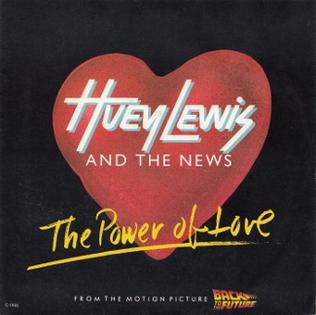
"The Power of Love" is a 1985 single by Huey Lewis and the News, written for the soundtrack of the 1985 blockbuster film Back to the Future. The song became the band's first number-one hit on the U.S. Billboard Hot 100 and their second number-one hit on the U.S. Mainstream Rock chart. In the United Kingdom, it was released as a double-A side with "Do You Believe in Love," becoming the band's only top ten hit on the UK Singles Chart. The song is included alongside "Back in Time" on the film's soundtrack, and appears as a bonus track on international editions of the band's fourth studio album, Fore!. The song also played at the end of "I Wanna Hold Your Hand," an episode of The Really Loud House.
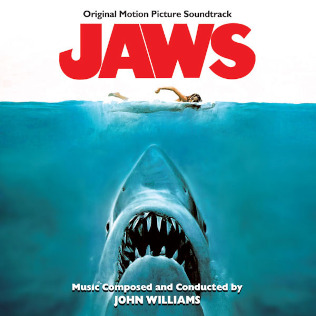
The Jaws soundtrack is the music composed and conducted by John Williams for Steven Spielberg's 1975 film Jaws. The soundtrack is particularly notable for the 2-note ostinato which represents the shark, a theme so simple that Spielberg initially thought it was a joke by the composer.

Back to the Future: The Pinball is a 1990 pinball machine designed by Joe Kaminkow, Ed Cebula and released by Data East, based on the film trilogy.

In the Back to the Future franchise, the DeLorean time machine is a time travel vehicle constructed from a retrofitted DMC DeLorean. Its time travel ability is derived from the "flux capacitor", a component that allows the car to travel to the past or future. This occurs when the car accelerates to 88 miles per hour and requires 1.21 "jigowatts" of electricity.

Back to the Future: The Game is an episodic graphic adventure video game based on the Back to the Future film franchise. The game was developed and published by Telltale Games as part of a licensing deal with Universal Pictures. Bob Gale, the co-creator, co-writer, and co-producer of the film trilogy, assisted Telltale in writing the game's story. Original actors Michael J. Fox and Christopher Lloyd allowed the developers to use their likenesses in the game for the lead characters Marty McFly and Doc Brown, respectively. Although Lloyd reprises his role as Doc, A.J. Locascio plays the role of Marty, while Fox later appeared to voice two cameo roles in the final episode, reprising his role as future versions of Marty McFly in addition to playing his forefather William.
The Avengers (Original Motion Picture Soundtrack) is the film score for the Marvel Studios film The Avengers composed and conducted by Alan Silvestri. It was released by Hollywood Records on May 1, 2012. A separate soundtrack and concept album, titled Avengers Assemble (Music from and Inspired by the Motion Picture), by various artists was also released on the same date.

Back to the Future: The Musical is a musical with music and lyrics by Alan Silvestri and Glen Ballard and a book by Bob Gale. It is adapted from the 1985 film Back to the Future by Robert Zemeckis and Gale. The show features original music, as well as songs featured in the film.
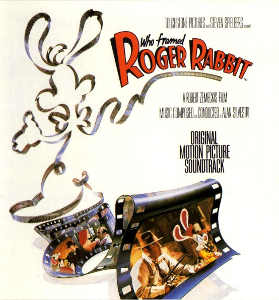
Who Framed Roger Rabbit (Original Motion Picture Soundtrack) is the soundtrack album to the 1988 film Who Framed Roger Rabbit, directed by Robert Zemeckis and featured film score composed by regular Zemeckis collaborator Alan Silvestri, who conducted the London Symphony Orchestra. The musical score was heavily influenced on Carl W. Stalling's music composed for Looney Tunes. Apart from Silvestri's score, the film also features performances of "Hungarian Rhapsody", "Why Don't You Do Right?" by Amy Irving as Jessica Rabbit, "The Merry-Go-Round Broke Down" by Charles Fleischer as Roger Rabbit, and a choral version of "Smile, Darn Ya, Smile!" performed by the Toons.

Back in Time is a 2015 American documentary film directed by Jason Aron. The film explores the production, impact, and legacy of the Back to the Future film series, and includes interviews with members of the series' cast and crew, including Robert Zemeckis, Steven Spielberg, Michael J. Fox and Christopher Lloyd, as well as fans of the franchise.

Pinocchio (Original Soundtrack) is the soundtrack to the 2022 Disney film Pinocchio, a live-action remake of Walt Disney's 1940 animated film of the same name, which is itself based on the 1883 Italian book The Adventures of Pinocchio by Carlo Collodi, the film is directed by Robert Zemeckis, and starred Tom Hanks, Cynthia Erivo and Luke Evans with Benjamin Evan Ainsworth (as the title character), Joseph Gordon-Levitt, Keegan-Michael Key and Lorraine Bracco in voice roles. The musical score is composed by Alan Silvestri, who regularly collaborated in all of Zemeckis' films. Besides producing the score, Silvestri also wrote new songs for the film, with songwriter-producer Glen Ballard, while the songs from the original counterpart were also featured in the album. Walt Disney Records released the soundtrack album on September 6, 2022.

Allied (Music from the Motion Picture) is the soundtrack to the 2016 film of the same name directed by Robert Zemeckis. The film was scored by Zemeckis' regular collaborator Alan Silvestri in his 16th film together, ever since their collaboration with Romancing the Stone (1984). The album consisted 13 tracks from Silvestri's score released by Sony Classical Records on November 11, 2016.

